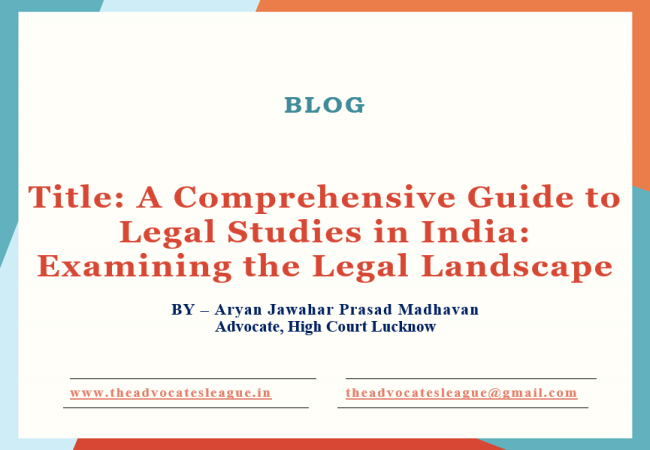A Comprehensive Guide to Legal Studies in India: Examining the Legal Landscape

A Comprehensive Guide to Legal Studies in India: Examining the Legal Landscape
Introduction:
In India, the field of legal
studies is vibrant and multidimensional, covering a broad spectrum of topics
and providing a variety of professional options. India's legal system offers a
rich tapestry for anybody interested in comprehending and influencing the
nation's legal framework, from criminal justice to constitutional law. We will
explore the essential elements of legal studies in India in this blog article,
looking at the educational system, potential career paths, and the dynamic
character of the legal industry.
Routes
for Education:
India's legal education system has
changed significantly throughout the years. After earning a bachelor's degree
in any field, the typical route to become a lawyer entails studying a
three-year LL.B. (Bachelor of Laws). Nonetheless, a lot of Indian law schools
also provide integrated five-year programmes that combine a bachelor's degree
with a legal degree. Degrees like B.A. LL.B. or B.B.A. LL.B. are frequently
awarded for these programmes. Well-known law schools with stringent admissions
procedures and demanding academic curricula include the National Law
Schools/Universities (NLUs). For admission to their undergraduate and graduate
law programmes, NLUs administer the Common Law Admission Test (CLAT), a
different entrance exam.
One option for after graduation is
to pursue an LL.M. (Master of Laws) degree, which enables specialisation in
fields including criminal law, human rights law, and international law, among
others. Those who are interested in academic research and teaching can also
pursue a Ph.D. in law.
Curriculum
and Areas of Expertise:
India's legal curriculum includes a
wide range of topics, such as criminal law, contract law, family law,
administrative law, and constitutional law. In addition to the required
courses, law schools frequently provide electives that let students focus on
particular interests. A few of the new legal specialties that are arising in
reaction to societal and technical changes are cyber law, corporate law,
intellectual property law, and environmental law.
Internships, moot court
competitions, and clinical legal education programmes are essential components
of the legal education system that give students real-world experience and help
them hone their advocacy abilities.
Opportunities
for a Career:
Many professional options are
available to those with a law degree. The most conventional route is to become
an advocate or attorney. Attorneys have three career options: they can work
alone, join law firms, or join corporate legal departments. Law graduates may
consider careers in legal research, policy analysis, and consulting in addition
to litigation. A lot of law graduates also decide to work in the judiciary,
public interest litigation, or government services.
With its many subfields, including
employment law, intellectual property, and mergers and acquisitions, corporate
law has become more and more well-known in recent years. This has made it
possible for legal professionals to work in corporate firms and multinational
corporations, often at lucrative salaries.
The
Legal System in India:
Anyone studying law in India has to
have a basic understanding of the Indian legal system. India has three levels
of courts under its federal system: district courts, which are subordinate to
the Supreme Court, High Courts in each state, and the highest court in the
land. The judiciary is essential to interpreting the law and protecting
citizens' rights.
India has a broad legal system that
consists of both national laws and customary norms specific to individual
groups. The flexibility of the legal system to adjust to shifting socioeconomic
dynamics is demonstrated by recent legal changes like the introduction of the
Goods and Services Tax (GST) and the changing nature of data protection
regulations.
Conclusion:
Those who are interested in the
complexities of justice and law will find that studying law in India is an
exciting and fulfilling experience. A career in law can lead to a meaningful
and influential professional life given the strong educational foundation, wide
range of specialisations, and ever-changing legal landscape. Whether you aim to
be a litigator, legal consultant, or contribute to policy-making, legal studies
in India give a solid foundation for a choice of fascinating and rewarding
professional possibilities.
REFERENCES
·
Menon,
N. R. (2003). Legal Education in India: Past, Present, and Future. Journal of
the Indian Law Institute, 45(1), 29–40.
·
Jain,
M. P. (2008). Indian Legal Education at Crossroads: A Report of the Committee
on Legal Education and Training.
https://www.ugc.ac.in/pdfnews/8326906_Report-on-Legal-Education.pdf
·
Narayan,
J. (2012). Legal Education in India: Recent Trends and Future Prospects. The
Indian Journal of Law and Technology, 8(2), 129–150.
·
Chakrabarti,
P. (2015). Legal Education in India: A Historical Overview. Indian Journal of
Law and Justice, 6(2), 57–69.
·
Pande,
R. (2019). Legal Education in India: Challenges and Opportunities. Legal News
and Views, 16(1), 12–21.
·
Sharma,
R., & Babu, M. S. (2011). Legal Profession in India: Emerging Trends.
Journal of the Indian Law Institute, 53(1), 17–29.
·
The
Bar Council of India. (2020). Legal Education Rules, 2020. Retrieved from https://www.barcouncilofindia.org/legal-education/legal-education-rules-2020/
·
Subramanian,
R. (2018). The Changing Landscape of Legal Education in India. Journal of Legal
Studies Education, 35(1), 75–104.
·
Singh,
J. P. (2017). Legal Research and Writing in India: An Overview. Indian Journal
of Law and Justice, 8(1), 69–78.
·
The
National Law School of India University Act, 1986. Retrieved from http://www.nls.ac.in/resources/nls-act/
